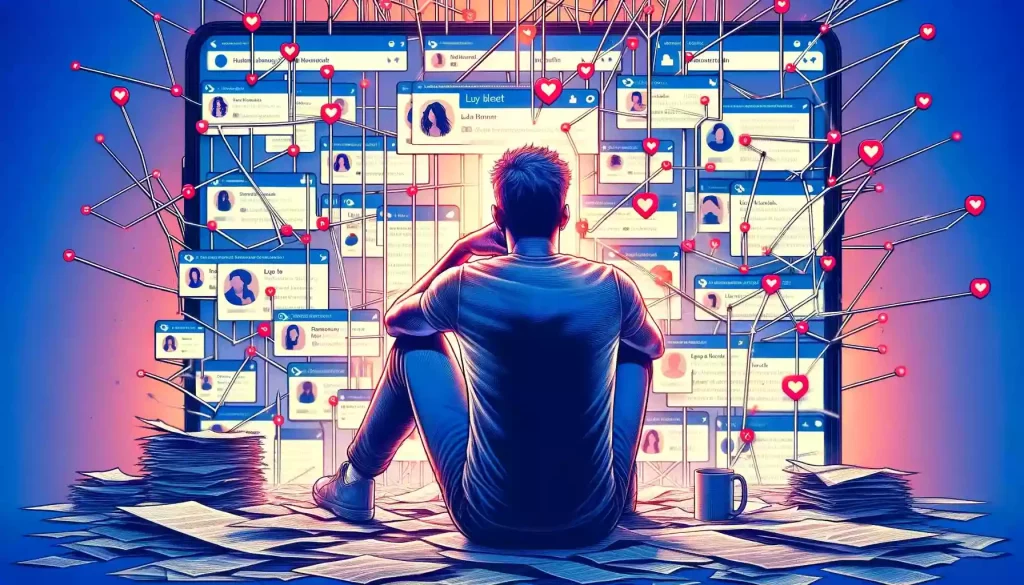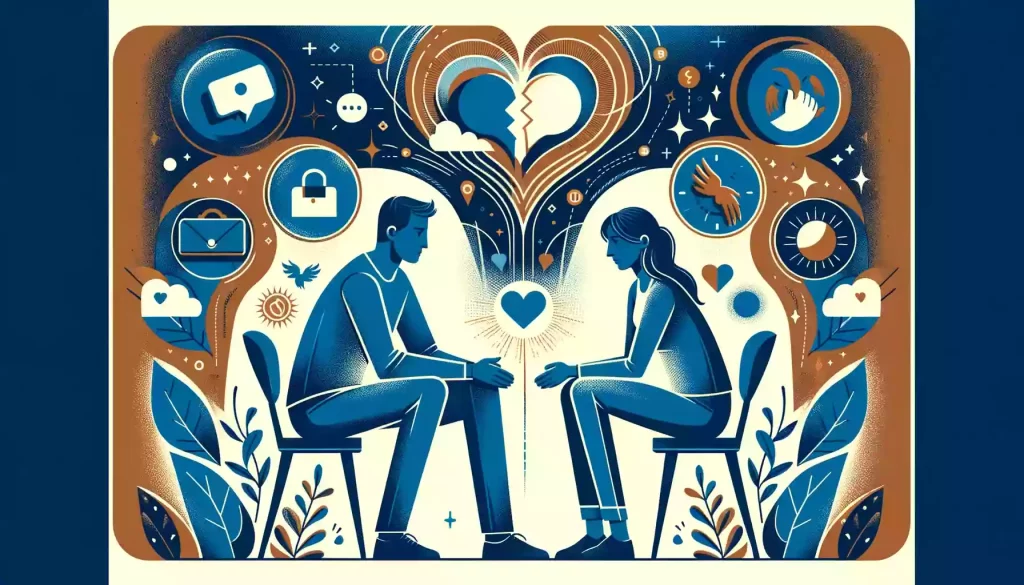Understanding the Breakup Blueprint
Embarking on the journey of a breakup can be daunting, tumultuous, and often a transformative experience. Understanding the intricate stages of this process is vital. The 'Breakup Blueprint' offers a structured approach to navigating these challenging times, helping individuals understand and manage their emotions effectively. From the initial shock and denial to the eventual acceptance and personal growth, each stage is a stepping stone towards emotional healing and self-discovery.
Breakups, though inherently painful, also present an opportunity for profound personal growth and self-reflection. The 'Breakup Blueprint' serves as a guide to harness these opportunities, aiding individuals in not just surviving their breakup but thriving beyond it.
Throughout this article, we will explore each stage of the 'Breakup Blueprint', providing practical advice and emotional insights to support you through your journey. Whether you're just beginning to sense the end of a relationship or are deep in the throes of a breakup, this blueprint is designed to offer clarity and direction.
Let's delve into the stages of the breakup process, offering a roadmap to navigate this complex emotional landscape.
Key Takeaways:- Understanding the 'Breakup Blueprint' stages can significantly aid in emotional healing.
- Each stage of a breakup offers unique challenges and opportunities for growth.
- Practical advice and insights are provided to navigate the breakup process effectively.
- The blueprint serves as a guide to not just survive, but thrive after a breakup.
- Personal growth and self-reflection are integral components of the healing process.
Stage 1: Recognizing the End - Acceptance and Clarity
Accepting the end of a relationship is often the first and most crucial step in the breakup process. It involves coming to terms with the reality that the relationship is over. This stage is marked by a mixture of emotions – denial, shock, and confusion – but ultimately leads to a clearer understanding of the situation.
It's common to question why the relationship ended and what could have been done differently. Reflecting on these questions is a natural part of the healing process. However, it's important to do so with the goal of gaining clarity and acceptance, rather than dwelling on what cannot be changed. This stage is about acknowledging the reality of the situation, understanding the reasons behind the breakup, and accepting that the relationship has reached its conclusion.
During this stage, you may find yourself revisiting memories and trying to piece together the narrative of your relationship. While it's essential to acknowledge these memories, it's equally important to recognize that they are now part of the past. Accepting this helps to pave the way for moving forward.
One of the key aspects of this stage is the shift from denial to acceptance. This shift might not happen overnight. It's a gradual process that requires patience and self-compassion. Acceptance does not mean you are happy about the breakup; rather, it means you acknowledge it as a reality and start to think about how to rebuild your life without the relationship.
Reaching a state of clarity and acceptance is a significant milestone in the breakup journey. It marks the end of one chapter and the beginning of another – a chapter where you start to rediscover yourself and explore what lies ahead in your life's journey.
Stage 2: Emotional Rollercoaster - Navigating Your Feelings

After recognizing the end of a relationship, you may find yourself on an emotional rollercoaster. This stage is characterized by a wide range of emotions, from profound sadness and longing to anger and frustration. It's a tumultuous phase, where feelings can change rapidly and unexpectedly.
One moment, you might feel an overwhelming sense of loss and grief, as if a part of your life has vanished. The next, you could be filled with anger or resentment towards your ex-partner or the circumstances that led to the breakup. It's important to understand that these emotions are normal and a necessary part of the healing process.
During this stage, it's crucial to allow yourself to feel these emotions without judgment. Trying to suppress or ignore them can prolong the healing process. Instead, find healthy ways to express and process your feelings. This might involve talking to a trusted friend, journaling your thoughts, or engaging in creative activities like painting or writing.
It's also a time for self-reflection. Ask yourself what you've learned from the relationship and the breakup. Reflect on your own needs and desires and think about how you can grow from this experience. This self-reflection can lead to significant personal growth and a deeper understanding of yourself.
Remember, it's okay to seek help if you're struggling to manage your emotions. Talking to a therapist or counselor can provide valuable support and guidance during this challenging time. The goal of this stage is not to eliminate your emotions but to navigate them in a way that leads to healing and growth.
Embracing this emotional rollercoaster is a vital part of the 'Breakup Blueprint.' It allows you to process your feelings, learn from them, and eventually find peace and balance within yourself.
Stage 3: Self-Reflection and Personal Growth

The third stage of the 'Breakup Blueprint' delves into self-reflection and personal growth. This stage is about looking inward and understanding yourself better in the wake of a breakup. It's a time for introspection, where you evaluate your past relationship, identify your strengths and weaknesses, and consider what you truly want in life.
Self-reflection involves asking tough questions about your role in the relationship and the breakup. It's about being honest with yourself and acknowledging both your achievements and your mistakes. This process is not about self-blame but about learning and growing from your experiences.
Personal growth is an integral part of this stage. It can manifest in various forms, such as pursuing new interests, developing new skills, or improving existing ones. This growth contributes to your overall well-being and helps in building a more fulfilling life post-breakup.
Another important aspect of this stage is to redefine your identity outside of the relationship. Often, people lose a sense of who they are in a relationship. Post-breakup, it's crucial to rediscover and reaffirm your individuality. This might involve reconnecting with old friends, trying new activities, or simply spending time alone to understand your needs and desires better.
Journaling can be a powerful tool for self-reflection. Writing down your thoughts and feelings helps to process them more effectively. It can also be enlightening to look back on your journal entries after some time to see the progress you've made.
Remember, personal growth is a continuous journey, not a destination. It's about evolving as a person and becoming the best version of yourself. Embrace this journey with an open heart and mind, and you'll find that you emerge stronger and more resilient than before.
The journey of self-reflection and personal growth is a transformative one, offering a chance to emerge from the shadows of a breakup into a brighter, more self-assured future.
Stage 4: Rebuilding: Strategies for Moving Forward
Once you've navigated the emotional ups and downs and embarked on a journey of self-discovery, the next stage of the 'Breakup Blueprint' is about rebuilding and moving forward. This stage is focused on taking practical steps towards creating a new life post-breakup.
One of the key strategies in this stage is setting new goals. These could be career goals, personal development goals, or even simple daily objectives. Setting goals gives you a sense of direction and purpose, something that is often lost in the immediate aftermath of a breakup.
Rebuilding also involves creating a new routine. After a breakup, your daily life can feel disoriented without your partner. Establishing a new routine helps bring back a sense of normalcy and stability. This might include new hobbies, exercise, or social activities.
Another important aspect is to nurture your social connections. Reconnecting with friends and family or making new connections can provide emotional support and distraction from the pain of the breakup. Social interactions are vital for mental health and can help in regaining a sense of belonging and community.
Finally, be open to new experiences. While it's important to grieve the end of a relationship, it's equally important to stay open to new opportunities. This could mean trying new activities, traveling, or even dating when you feel ready. Embrace these new experiences as part of your journey towards healing and growth.
Stage 5: The New Beginning - Embracing Change and New Opportunities

The final stage of the 'Breakup Blueprint' is about embracing the new beginning that comes after the end of a relationship. This stage is marked by a renewed sense of hope, freedom, and the excitement of new possibilities. It's a time to celebrate your growth and the journey you've been on.
Embracing change means acknowledging that life after a breakup can be different, but also rewarding. It's about seeing the breakup not as an end, but as a new start. This could involve exploring new interests, pursuing goals you had set aside, or simply learning to enjoy your own company.
A key aspect of this stage is the realization that you are in control of your happiness. Your well-being is no longer tied to someone else, and you have the freedom to shape your life the way you want it. This newfound independence can be empowering and exhilarating.
It's also a time to reflect on the lessons learned from the breakup. Each relationship and breakup teaches us something about ourselves, our needs, and our desires. Carrying these lessons forward can help you in future relationships and in your personal growth.
Being open to new relationships is also a part of this stage. While there's no rush to start dating again, being open to the idea of new love is a sign that you've healed and are ready to move forward. Remember, new relationships should enhance your life, not define it.
Finally, this stage is about gratitude – for the experiences you've had, the growth you've achieved, and the future that lies ahead. It's about looking forward to new adventures with a sense of optimism and excitement.
The journey through the stages of the 'Breakup Blueprint' can be challenging, but reaching this stage is a testament to your resilience and strength. Embrace this new beginning with open arms and an open heart.
Practical Tips for Healing and Self-Care
Alongside navigating the stages of the 'Breakup Blueprint', incorporating practical tips for healing and self-care is crucial. These tips can help you manage the emotional turmoil of a breakup and foster personal growth.
First and foremost, allow yourself to grieve. Grieving is a natural response to loss, and it's important to give yourself permission to feel sad, angry, or confused. This process is essential for healing.
Engaging in self-care activities can significantly aid in your recovery. This might include exercise, meditation, or simply doing things that you enjoy. Self-care is about nurturing your mind, body, and spirit.
Maintaining a healthy routine is also important. This includes regular sleep patterns, healthy eating, and physical activity. A stable routine can provide a sense of normalcy and stability during a tumultuous time.
Connecting with others is vital. Reach out to friends and family for support. Sometimes, just talking about your feelings can be incredibly therapeutic. Don't hesitate to lean on your support system during tough times.
Consider seeking professional help if you're struggling to cope. Therapists or counselors can offer guidance and support tailored to your situation. There's no shame in seeking help; it's a sign of strength and self-awareness.
Reflect on the relationship and breakup, but don't dwell on it. Use your experiences as learning opportunities for personal growth, not as a reason to ruminate on what went wrong.
Finally, remember that healing takes time. Be patient with yourself and recognize that moving on is a gradual process. Celebrate your small victories and acknowledge your progress.
Dealing with Social Media and Mutual Friends Post-Breakup

Navigating social media and mutual friendships post-breakup can be a complex and emotional aspect of the recovery process. Social media platforms often serve as a constant reminder of your past relationship, while mutual friends can present a tricky dynamic to manage.
One of the first steps is deciding how to handle your social media connections with your ex-partner. For some, unfollowing or unfriending is necessary to avoid painful reminders. For others, a more muted approach, like hiding their posts, might be preferable. The key is to do what feels right for your emotional well-being.
It's also important to consider your online behavior post-breakup. Avoid the temptation to constantly check your ex's social media profiles. This can hinder your healing process and prevent you from moving forward. Setting boundaries for yourself in terms of social media use can be very helpful.
When it comes to mutual friends, open communication is crucial. It's okay to express your feelings and set boundaries. If certain social situations with mutual friends are too difficult, it's perfectly acceptable to take a step back and focus on your healing.
Another aspect to consider is how much you share about your breakup on social media. While it's normal to want to express your feelings, remember that social media is a public platform. Consider the implications of what you share and who might see it.
It's also worthwhile to invest time in friendships outside of your mutual circle. These friends can provide a fresh perspective and support that's removed from the context of your past relationship.
Lastly, remember that it's okay to take a break from social media altogether. Sometimes, stepping away from the digital world can be incredibly liberating and conducive to healing.
FAQs: Common Questions About Navigating Breakups
In this section, we address some common questions about navigating the complexities of a breakup, providing insights and advice to help you through this challenging time.
Q: How long does it take to get over a breakup?
A: The time it takes to heal from a breakup varies greatly from person to person. Factors like the length and intensity of the relationship, personal resilience, and the presence of a support system all play a role. It's important to be patient with yourself and allow the healing process to unfold at its own pace.
Q: Is it normal to feel relief after a breakup?
A: Yes, feeling relief after a breakup is completely normal, especially if the relationship was troubled or unhappy. It's a sign that you recognize the breakup was a healthy decision for your well-being.
Q: Should I stay friends with my ex?
A: Deciding to stay friends with an ex is a personal choice and depends on several factors, including the nature of the breakup and your current emotional state. If maintaining a friendship hinders your healing or causes discomfort, it may be best to keep a distance.
Q: How can I deal with feelings of loneliness post-breakup?
A: Coping with loneliness can involve engaging in activities you enjoy, spending time with friends and family, and possibly exploring new interests or hobbies. It's also an opportunity for self-reflection and personal growth.
Q: Is it okay to date again soon after a breakup?
A: There's no right or wrong time to start dating again after a breakup. It's about when you feel emotionally ready and not about adhering to a specific timeline. However, ensure you've given yourself enough time to heal and learn from your past relationship.
Q: How do I know if I need professional help?
A: If you find yourself struggling to cope with the breakup, experiencing prolonged feelings of sadness or depression, or if it's affecting your daily life significantly, seeking professional help can be beneficial.
How to Communicate Effectively During a Breakup

Effective communication during a breakup is crucial for ensuring that both parties understand and respect each other's feelings and perspectives. It involves being honest, clear, and compassionate.
The first step in effective communication is to be clear about your reasons for the breakup. Speak honestly, but with sensitivity to the other person's feelings. It's important to avoid blame and focus on your feelings and needs.
Listening is just as important as speaking. Allow your partner to express their feelings and thoughts. This shows respect and acknowledges their perspective, even if it differs from yours.
Choose an appropriate time and place for the conversation. A private, quiet setting where you won't be interrupted is ideal. It's important to have this conversation face-to-face if possible, as it shows respect for the relationship you've had.
Avoid using absolute statements like "You always" or "You never." Instead, use "I feel" statements to express your emotions without placing blame on the other person.
Keep the conversation focused on the present situation. Bringing up past issues can complicate the discussion and prevent a clear resolution.
It's also vital to set boundaries post-breakup. Discuss how you'll handle contact, social media, and mutual friends. Clear boundaries can help both parties move on more effectively.
Lastly, acknowledge that breakups can be emotional. If the conversation becomes too heated, it might be best to pause and continue at another time when both parties are calmer.
The Role of Professional Help: When to Seek Counseling
Professional help in the form of counseling or therapy can be invaluable during and after a breakup, especially when navigating the emotional complexities involved.
One of the primary reasons to seek counseling is if you're experiencing overwhelming emotions that are difficult to manage. This includes prolonged sadness, anxiety, or depression that affects your daily life.
A counselor can provide a safe, neutral space to express and process your emotions. They can offer an objective perspective and coping strategies that friends or family might not be able to provide.
If you find yourself stuck in negative thought patterns, unable to move forward, counseling can help. A professional can assist you in developing a healthier mindset and overcoming obstacles to your healing.
Therapy can also be beneficial if you're repeating unhealthy relationship patterns. Understanding these patterns and the underlying causes can help you make healthier choices in future relationships.
For those struggling with co-dependency or identity loss post-breakup, counseling can offer guidance in rediscovering and rebuilding your sense of self.
It's important to remember that seeking professional help is a sign of strength, not weakness. It shows a commitment to your mental health and overall well-being.
Finally, even if you feel you're managing well, counseling can be a proactive way to ensure you're on a healthy path post-breakup. It's an investment in your future happiness and emotional health.
Creating a Support System: Friends, Family, and Communities
One of the most important aspects of navigating a breakup is having a strong support system. Friends, family, and communities can provide essential emotional support, practical help, and a sense of belonging during this challenging time.
Friends can offer a listening ear, a shoulder to cry on, or a distraction when you need it. Don't hesitate to reach out to them, even just for a chat or a coffee. It's important to maintain social connections and not isolate yourself.
Family members can provide a different type of support. They often know you better than anyone else and can offer comfort and advice based on a deep understanding of your history and personality.
Engaging with your community can also be healing. This could be through group activities, clubs, or volunteer work. Being part of a community gives you a sense of purpose and connection, helping you feel less alone in your journey.
If your current social circle is closely tied to your ex, it might be time to expand your network. Meet new people through activities and hobbies that interest you. New friendships can provide fresh perspectives and positive experiences.
Support groups, either in-person or online, can also be beneficial. They offer a space to share your experiences with others who understand what you're going through. These groups can provide comfort, advice, and solidarity.
Remember, it's okay to ask for help and lean on others. A breakup can be a profound emotional experience, and you don't have to go through it alone. A strong support system is key to your healing and recovery.
Conclusion: Turning a Breakup into a Breakthrough
As we conclude our journey through the 'Breakup Blueprint', it's important to recognize that a breakup, while challenging, can also be a catalyst for personal growth and positive change.
A breakup can be an opportunity to rediscover yourself, explore new interests, and develop a deeper understanding of what you want from life and relationships. It's a chance to learn from your experiences and grow stronger.
Embrace the lessons you've learned through this process. They are valuable insights that can guide you in future relationships and life decisions. Each stage of the breakup has taught you something important about yourself and your needs.
Moving forward, use these lessons to build healthier relationships. Understanding your needs, boundaries, and communication style will help you create more fulfilling connections in the future.
Remember, healing from a breakup is a journey. There will be ups and downs, but each step forward is progress. Celebrate your growth and the resilience you've shown throughout this process.
Finally, be open to the future and all its possibilities. A breakup is not just an end, but also a beginning. It's an opportunity to create a life that is aligned with your true self and your aspirations.
With the insights and strategies outlined in the 'Breakup Blueprint', you are now equipped to turn your breakup into a breakthrough. Embrace your journey with optimism, and look forward to the new and exciting chapters that lie ahead in your life.
Recommended Resources
- Rebuilding: When Your Relationship Ends, Bruce Fisher and Robert Alberti, Impact Publishers, 2016
- The Journey from Abandonment to Healing: Turn the End of a Relationship into the Beginning of a New Life, Susan Anderson, Berkley Books, 2000
- It's Called a Breakup Because It's Broken: The Smart Girl's Break-Up Buddy, Greg Behrendt & Amiira Ruotola-Behrendt, Broadway Books, 2005
- Breaking Upwards: How to Manage the Emotional Impact of Separation, Charlotte Friedman, Vermilion, 2013





.jpg.1626fbc48c04fd9021fd315819807524.thumb.jpg.882936eb5901fa05cf31c75617acde2e.jpg)
Recommended Comments
There are no comments to display.
Create an account or sign in to comment
You need to be a member in order to leave a comment
Create an account
Sign up for a new account in our community. It's easy!
Register a new accountSign in
Already have an account? Sign in here.
Sign In Now